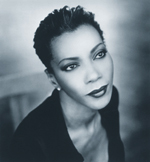
|
|
|
|
|
|
Photo Credit: Unknown |
Carmen Lundy
On this edition of Billy Taylor's Jazz at the Kennedy Center, Dr. Taylor and the trio are joined by the talented jazz vocalist Carmen Lundy. Although primarily known for her singing, Lundy also composes and produces. During this evening at the Kennedy Center's Theater Lab, Lundy treats the audience to both her wide-ranging singing style and penetrating insights on the art of jazz. Born in Miami, Florida, Lundy grew up on a steady diet of gospel music. At an early age, with three family members already in her church's choir, Lundy spent most of her time simply listening, but she was learning all the while. She gained a tremendous sense of harmony and learned the power of "call and response," which she refers to as the backbone of the black church experience in America. Although frowned upon by her family, both R&B and soul also influenced the impressionable young Lundy. This "devil's music" found its way into her life outside of church, at parties and on Saturday nights. Early on, her favorites included the work of Elmore James, Brook Benton, and eventually James Brown. Lundy began her recording career at the age of sixteen. Carmen joined a fellow choir member and auditioned for The Brothers and Sisters. She played piano at the time, and the experience opened up her ears to other styles of phrasing on her instrument. Soon, Lundy found herself listening to some of the most influential jazz pianists: Bill Evans, Herbie Hancock, and Joe Zawinul. This discussion leads Lundy and Dr. Taylor's trio into a beautiful rendition of Mancini's "Moment to Moment." Lundy explains that she attended the University of Miami where she explored her budding love for jazz. She intended to major in performance with a focus on singing, but the university only provided vocals coursework through its opera department. She chose to study jazz despite this hurdle, and the choice proved beneficial. She took a variety of classes, including composition, and when her teacher, Ronny Miller, pushed her to write her own songs, Lundy found she had a gift. Then she and the trio perform a stellar version of her song "Never Gonna Let You Go," which contains a biographical story line. Dr. Taylor asks Lundy about the traveling that she has done as a result of her jazz career. She expresses thanks for the fact that her singing has introduced her to most of Europe and the Far East, and points out that when she works in Asia, the audience there shows a knowledge and sensitivity for jazz which exceeds that shown in the United States. "We're worlds apart because of the language, but the music was almost like meeting a distant cousin you know because they're so familiar," Lundy points out. Lundy accentuates her singing career by continually exploring her creative abilities in other genres. She has studied dance, earned critical acclaim for her painting ability, and acted in two formidable productions: Sophisticated Lady, and They Were All Gardenias - which featured her in the role of Billie Holiday. "Acting," Lundy says, "helps me get more comfortable and acquainted with the art of performance." Within the business world of music, Lundy not only sings and writes, but she recently started her own record company, CLR. During the question and answer segment with the audience, one audience member asks Lundy about her use of vibrato in singing. Lundy, who makes liberal use of vibrato, believes that most singers avoid it for two reasons: they fear how vulnerable vibrato will leave them in front of their audience, and "all of us want to sound and play like Miles...that muted trumpet sound, that cool stream of air." Later, another audience member asks her about her preference in terms of venue size. Lundy relates that she not only likes smaller, more intimate clubs more than larger arenas, but she feels that jazz "was born out of the intimate vibe," at which point the crowd heartily applauds. A final question is posed to Lundy regarding the lack of females in the jazz world. Lundy believes that society has been led to believe that only men ought to inhabit the jazz world, and this obvious mistake bears itself out when we listen to music. When we simply hear jazz, no discernible distinction exists between the playing of a man and that of Teri Lynne Carrington, or Patrice Rushen, or Mary Lou Williams. Therefor, Lundy argues that women must "own their power," because women are "less of a disadvantage and more of...a threat." The audience booms at this declaration, and Lundy lives out her point by exerting her formidable abilities within every area of jazz. The show concludes with a version of the standard "There'll Never Be Another You."
|
|
| |
